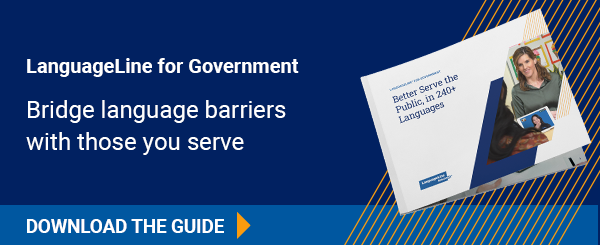
Tens of thousands of Afghans are arriving on U.S. and Canadian soil at the end of America’s longest war. Throughout North America, people and organizations stepped forward to welcome Afghans in one of the largest mass mobilizations since the end of the Vietnam War. LanguageLine® provides translation and interpretation for Afghanistan refugees, as well as explanations about the differences between various languages.
LanguageLine has addressed this surge in need, as we know this historic time has greatly impacted many of the healthcare organizations and government agencies with which we are fortunate to work. We provide interpretation, translation, and localization that covers the vast majority of demand from the region.
Language Availability
We are pleased to provide translation and interpretation in these languages:
- Dari – Appointment recommended
- Pashto – Interpreters available on-demand; appointments available, if needed
- Uzbek – Interpreters available on-demand; appointments available, if needed
- Turkmen – Appointment recommended for interpretation
- Urdu – Interpreters available on-demand; appointments available, if needed
We are constantly monitoring the need for translation and interpretation for Afghanistan refugees. We will continue to make necessary adjustments to address increased demand in these or other languages spoken by Afghan refugees.
Tips for Assisting with Afghan Languages
The languages spoken in Afghanistan are nuanced. Here is a little bit of information that may help you understand these subtleties.
Dari
- Dari is one of the two official languages of Afghanistan. It is also known as “Afghan Persian” and “Eastern Farsi.” It is important to note that Farsi (also referred to as “Persian”) is the official language of Iran, and while they are dialects of the same language, they are very different when spoken.
- Dialects of Dari: Tangshew (Tangshuri) and Darwazi. (Callers should simply request “Dari.”)
- If the caller selects Afghan Persian, Eastern Persian, or Afghanistan when using the LanguageLine app, Dari will be returned as a choice.
Pashto
- Pashto is the other official language of Afghanistan. Because Dari is the language of business and higher education in Afghanistan, Pashtuns often learn Dari. Very few Dari speakers have a good command of Pashto.
- Southern Pashto is also referred to as “Afghan Pashto,” “Kandahari Pashto,” “Qandahari Pashto,” and “Southwestern Pashto.” There are speakers of Northern Pashto (of Pakistan) who reside in Afghanistan.
- When using the LanguageLine App, the client can type in: Afghan, Pakhtoo, Paktu, Pashtu, Pushto, Afghanistan, or United Arab Emirates. All are aliases for Pashto and will return Pashto as a result.
Uzbek
- Uzbek from Afghanistan and Uzbek from Uzbekistan are not the same. While there are similarities, we staff with speakers from both areas.
- Southern Uzbek is the variation spoken in Afghanistan. Northern Uzbek is the one from Uzbekistan.
Urdu
- In addition to Afghanistan, Urdu and Punjabi are also spoken in Pakistan and India.
LanguageLine Can Help
We are prepared to support our clients as they welcome refugees from Afghanistan into their communities.
LanguageLine has provided similar support during resettlement after conflicts in Iraq, the Balkans, Somalia, Rwanda, Myanmar, and others. This includes the difficult job of interpreting for individuals who have lived through traumatic events or who are unfamiliar with North American culture. These are precisely the times when interpreting skills are most needed.
Please contact your LanguageLine representative for more information. If you are not currently a LanguageLine client, we would be most pleased to have a conversation about your specific needs. Please contact us through our website, via email at customercare@languageline.com, or via phone at 800-752-6096.




